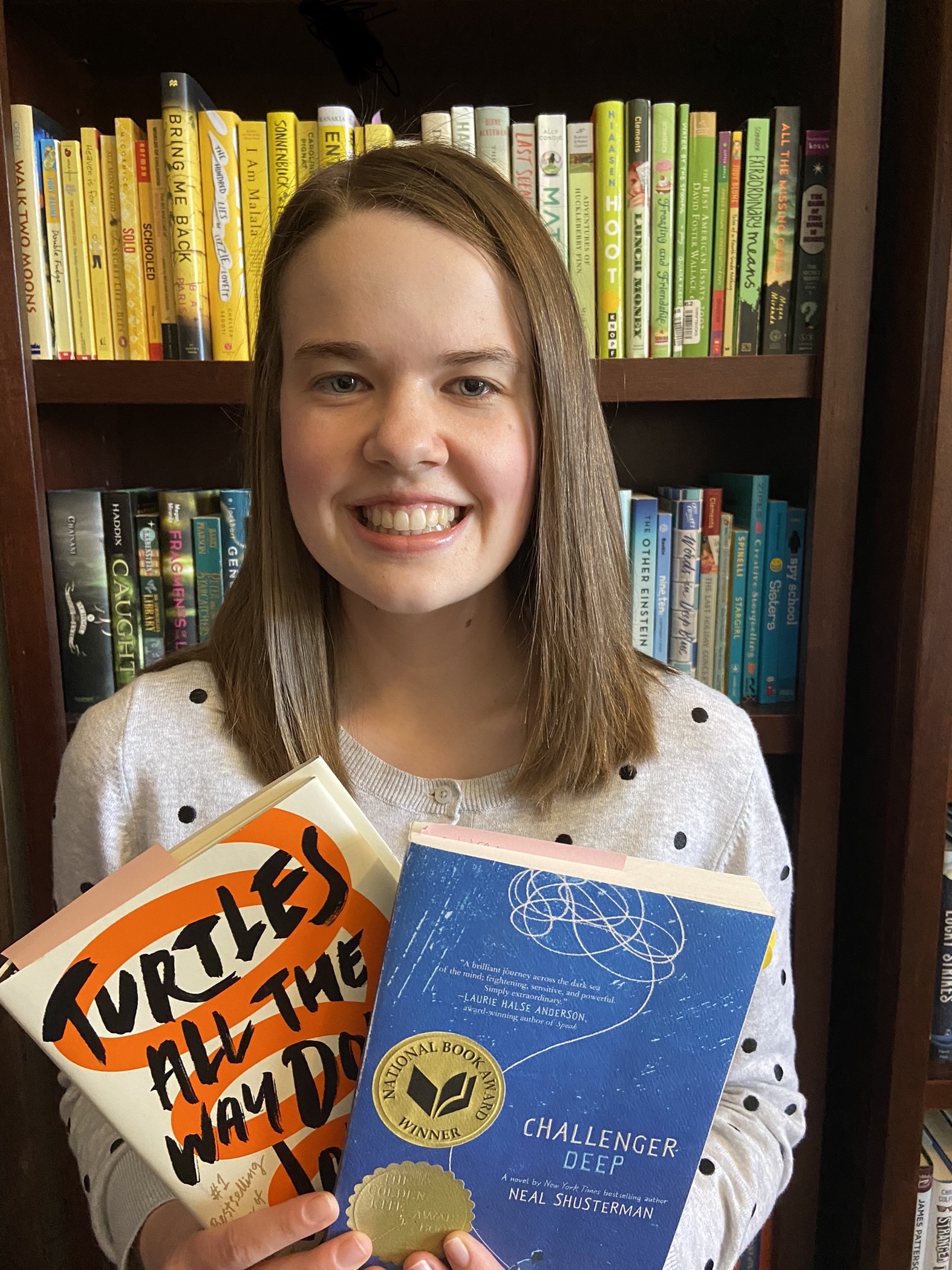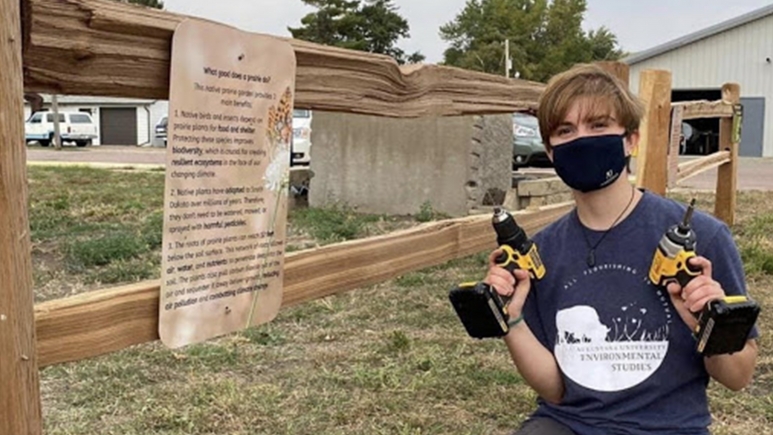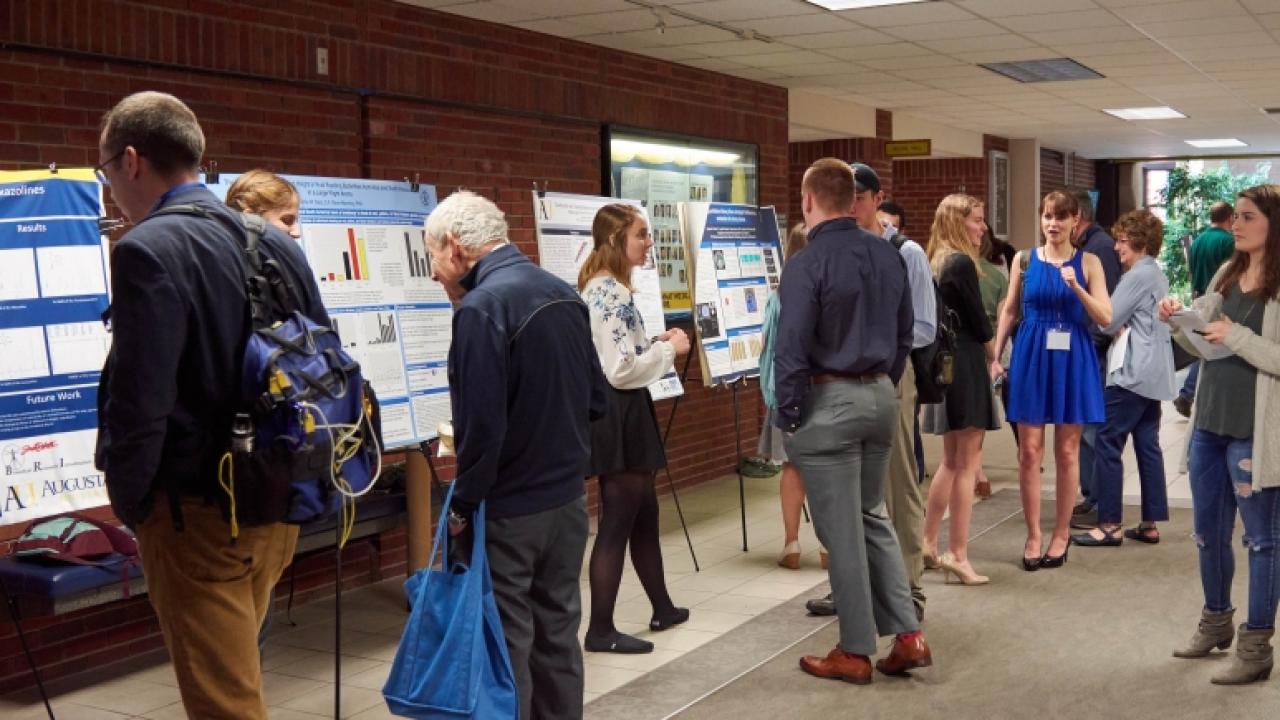Pictured: 2019 Arthur Olsen Student Research Symposium
April 29, 2021
Written by University Writer Betsy Mans
Each spring, Augustana University celebrates our outstanding student research in the campus-wide Arthur Olsen Student Research Symposium. Named in honor of Dr. Arthur (Art) Olsen in 2015, the symposium highlights the impact of faculty mentorship, collaboration, the liberal arts and experiential learning. This year will mark its 20th anniversary, which will be held virtually on Thursday, April 29, and Friday, April 30.
Working with a faculty member, students participating in the symposium select a topic, prepare a presentation and submit it to a panel for review. If selected by the panel, students have the opportunity to showcase their research during the symposium via a poster or 15-minute oral presentation.
This year, many of the student presentations focus on solving challenges that have surfaced in the midst of the COVID-19 pandemic. Taking care of your health is one example, with Logan Stacey’s ‘22 presentation, “Biohacking: A Powerful Mechanism for Changing Human Physiology and Transforming our Health Care System.”
In his presentation, the Watertown, South Dakota, native explains, “Starting today, you could take charge of your health and life by making simple changes in your habits that could give you profound benefits and make you happier. It could change the way we live our lives, and our culture. People are chronically tired, with different sorts of health problems that we could fix and divert money to different ways to shape society. This could change how long and well we live, as more humans are going back to the way of life we are evolutionarily made to do.”
Stacey is a critical thinker who is “super interested in fitness, health, modern medicine and public health.” He likes to figure out how to work through problems.
“Anything that will be used in a clinic, or facts in this day and age, has to have tons of research in it, and I want to be part of it,” said Stacey.
Dr. Paul Egland, professor of biology, served as Stacey’s mentor.
“Faculty often say that they especially enjoy teaching when they get to learn from their students,” Egland said. “That has never been so true for me as it is working with Logan. His keen interest in enhancing and optimizing human health by simple biohacking is inspirational. His passion about this will benefit his patients someday when he is a physician.”
In the 15-minute Q&A session after his presentation, Stacey hopes to help others by providing resources they can explore. He plans to go to medical school in the future and establish his own clinic.

Another important aspect of the pandemic is mental health. As a future teacher, Brooklynn Gross ‘22 will share her presentation, “Using Young Adult Literature to Destigmatize Mental Illness.”
The English and secondary education major from Sioux Falls, South Dakota, shared how she has “been reading articles about mental health and how students have been stressed being home. Teachers need to be more aware of mental health, especially in the years to come after the pandemic ends. From going into isolation to financial problems, or having a loved one die, people think they can’t talk about it.”
Gross is a firm believer that every teacher has a responsibility to speak with students about mental health.
“I based my Civitas (Honors Program) final vocation project on the topic,” she said, “and in preparing the lesson plans, I saw how young adult literature can impact students and align with Common Core educational standards. It can be really beneficial.”
Destigmatizing mental health, addressing and paying attention to it are three action steps Gross identifies in advancing the conversation and helping students.
“I hope in the future, students can come to me or I can provide them with resources to go to,” Gross shared.
Dr. Beth Boyens, assistant professor of English, mentored Gross throughout the project.
Boyens said, “Brooklynn is one of the most self-motivated and organized students I know, so she was really easy to work with. Besides that, she is a smart and insightful interpreter of literary texts, a strong writer and passionate about her future career in teaching. All of those things came together in this project, and I was honored to be a part of it.”
In the midst of the pandemic, the U.S. witnessed another historical milestone — the election of the first female vice president of color, Kamala Harris.
Thea Patrick’s ‘22 presentation, “The Effects of Emphasizing Feminine and Masculine Traits on Evaluations of Female Political Candidates of Different Races and Ethnicities,” highlights the noticeable absence of research on the topic.
Patrick explained, “These (political) experiences can’t just be reduced to women, or race/ethnicity. It’s an extremely important and underresearched area. I went into my research with interest, and it’s become even clearer to me that this matters — the way women are perceived in politics. When it comes to stereotypes, there is strong evidence women are affected by them. There is a more nuanced understanding of systems-level processes of gender and race.”
Patrick is a Mitchell, South Dakota, native double majoring in psychology and government & international affairs, and minoring in French. The Civitas Honor Program student was responsible for every aspect of the project, from the initial design of the psychology experiment to the analysis of the data before symposium, and learned a lot from the experience.
Her mentor, Associate Professor of Psychology Dr. Anne Zell, said, “This amazing, professional-quality project is entirely Thea’s! She conceived of the research question, formulated hypotheses and devised the method and materials, showing great creativity and resourcefulness. I have simply been providing a little guidance along the way. It has been exciting to see Thea tackle such an ambitious project, and so capably. Obviously, I’m very proud of her!”
After graduation, Patrick hopes to conduct campaign messaging. She “wants to do public opinion polling of how people view candidates.” She is thinking of staying in South Dakota for the 2022 elections.
When asked what the symposium means to her, Patrick said that she “put a lot of effort into the project. It’s a finished product I can be proud of. The symposium is a good platform to see what Augustana students are capable of.”
Augustana has seen firsthand that students are capable of changing the world for the better. In fact, one student in particular, is making a positive impact on campus.

 Mia Werger ‘22 has been working to restore a portion of Augustana’s campus into its native prairie habitat. Her award-winning poster presentation is named, “Vanishing Kingdom: The Chronicle of a Micro-Prairie Restoration in Sioux Falls, South Dakota.” The Minneapolis, Minnesota, native will be receiving the Lifelong Learner Award for Developing Knowledge that is Critical for Understanding and Caring for our Changing World.
Mia Werger ‘22 has been working to restore a portion of Augustana’s campus into its native prairie habitat. Her award-winning poster presentation is named, “Vanishing Kingdom: The Chronicle of a Micro-Prairie Restoration in Sioux Falls, South Dakota.” The Minneapolis, Minnesota, native will be receiving the Lifelong Learner Award for Developing Knowledge that is Critical for Understanding and Caring for our Changing World.
The biology major with an environmental studies concentration is studying away in Alaska this semester. Her research began as a final project for her course in environmental philosophy and evolved into her submission to the symposium.
Werger shared, “One takeaway I hope people have from my presentation is finding other ways to measure the value of our natural resources besides financial value. Biodiversity, ecosystem resilience, quality of human life and genetic diversity are all missed in our current system of how we measure value.”
Mentor Dr. David O’Hara, professor of philosophy, classics and environmental studies and director of sustainability and environmental studies, said, “Mia constantly impresses me. It’s not just that she is brilliant and creative — which she is! — but just as importantly, she is willing to take the risk of trying things that others don’t even think about. Rather than accepting things as they are, she dares to imagine things being better, and then — and this is key — she starts making them better.”
The following students will receive cash for their research awards:
Keynote Speaker’s Early Influence Award
‘Public Transit: A Small Metropolitan Policymaker’s Next Step,’ by Audrey Cope ‘21, mentored by Dr. Joel Johnson
Interdisciplinary Research and Collaboration Award
‘EILMELDUNG! Journalismus Stirbt Nicht!: Ein Kurzer Blick Auf Die Journalistischen Praktiken Und Lösungen Heute’ (BREAKING NEWS! Journalism Is Not Dying: A Short Look at the Practices and Solutions of Today) by Callin Naddy ‘21, mentored by Dr. Stephan Lhotzky
Lifelong Learner Award for Enhancing Community Through the Understanding of Humans and Human Interactions
‘Perceptions of Mental Health Resources at Augustana University’ by Hailey Nold ‘21, mentored by Dr. Benjamin Jeppsen
Lifelong Learner Award for Enriching Lives Through Aesthetic and Creative Expressions
‘I Am of an Entirely Different Character": An Actor's Portrayal of Complex Morality in Euripides' Medea,’ by Kaitlyn (Kale) Hellman ‘21, mentored by Dr. Jayna Fitzsimmons
Lifelong Learner Award for Developing Knowledge that is Critical for Understanding and Caring for our Changing World
‘Vanishing Kingdom: The Chronicle of a Micro-Prairie Restoration in Sioux Falls, South Dakota,’ by Mia Werger ‘22, mentored by Dr. David O’Hara
The following students will receive cash for their poster awards:
‘Antimicrobial Effects of Placenta on Staphylococcus aureus Biofilms,’ by Jason Becker ‘21 and Ellie Holmes ‘21, mentored by Dr. Paul Egland
‘Effect of Lavender Aromatherapy on Sleep Quality,’ by Brinn Hollenbeck ‘20, Brendan Huisman ‘21, Michaela Udlock ‘21 and Khatera Sadat ‘21, mentored by Dr. Ranae Aukerman
‘Sex-Dependent Impacts of Environmental Enrichment on Angelman Syndrome Mice,’ by Jameson Cosgrove ‘21, Lauren Kelly ‘22 and Elizabeth Kiffmeyer ‘21, mentored by Dr. Alex Kloth
‘Using Quantum Dot-Aptamer Bioconjugates for Cancer Detection,’ by Kalista Vanden Berge ‘21 and Jamie Sommerdorf ‘21, mentored by Dr. Barrett Eichler
‘Mapping the Health of Washington State Forests,’ by Melanie Borson ‘22, mentored by Dr. Sarah Olimb
Participate in the Virtual Arthur Olsen Research Symposium
To view student presentations, virtual access will be available on Thursday, April 29, from 10:45 a.m. to 6:15 p.m., and Friday, April 30, from 10 a.m. to 4 p.m. Each student will share a Zoom link during their presentation for a Q&A session that will follow for discussion. To view the schedule and access student presentations, visit augie.edu/symposium.
The presentation of awards and keynote address will be held in the Chapel of Reconciliation on April 29, at 7 p.m. Dr. Sorcha Brophy will deliver an address titled, "Making Morals, Making a Difference?" Brophy is an assistant instructional professor at the Harris School of Public Policy, University of Chicago. She teaches courses on the politics of health care, police reform, organizational ethics, race-based policy in America and policy implementation. Seating will be limited at the awards ceremony due to physical distancing protocols, and masks will be required.
The symposium committee encourages everyone to register for the event.
